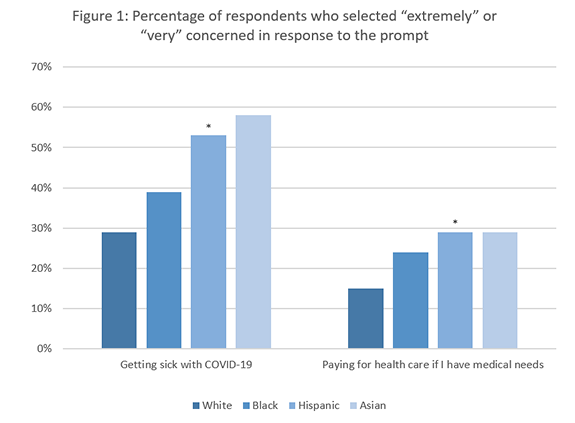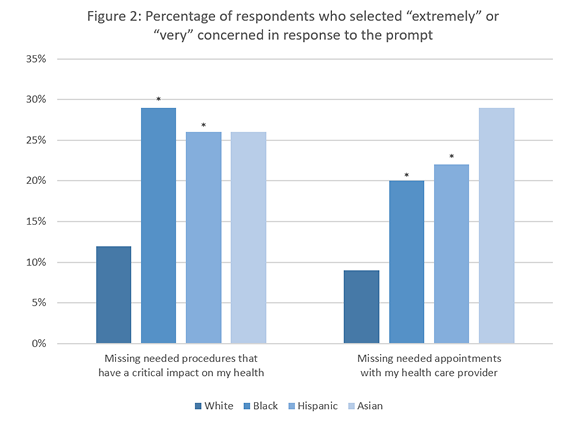Concerns over Getting Sick with COVID-19 and Paying for Health Care Disproportionately Affect Communities of Color
CHICAGO, June 16, 2020 – As evidence of racial disparities for the people infected with COVID-19 grows, concerns about getting sick and paying for health care disproportionately weigh on communities of color, according to a new AmeriSpeak® survey from NORC at the University of Chicago’s Medicaid Managed Care Organization Learning Hub. The survey also found that racial minorities are more concerned about getting sick with COVID-19 than white individuals.
The survey also found that over half of Hispanic respondents (53 percent) were either extremely or very concerned about getting sick with COVID-19, while 29 percent of white respondents described themselves as such. Other racial minorities also had a higher percentage of extremely or very concerned respondents compared to white respondents, including black respondents (39 percent) and Asian respondents (58 percent). The number of Asian respondents is too low to qualify for significance testing.
“These results are commensurate with longstanding racial and ethnic disparities in health and health care and early data, indicating that COVID-19 is disproportionately affecting communities of color,” said Scott Leitz, senior fellow at NORC. “Here in Chicago, COVID-19 death rates among African Americans are 2.6 times higher than among white residents.”


Asterisk (*) denotes a statistically significant difference from number of white respondents indicating they were extremely or very concerned. Note that the number of Asians respondents was too low to qualify for significance testing.
Significantly more Hispanic respondents (29 percent) indicated they were either extremely or very concerned about paying for health care during the pandemic compared to white respondents (15 percent). “Though our poll did not collect insurance status, this distribution may be related to higher uninsured rates among communities of color compared to white Americans,” said Leitz. “Native Americans and Latinos have the highest uninsured rates of any demographic group, with 22 percent of Native Americans and 19 percent of Latinos lacking coverage compared to 8 percent of whites.”2 Concerns about affordability may reinforce emerging racial disparities in COVID-19 outcomes, as out-of-pocket costs can deter individuals from seeking care for COVID-19.


Asterisk (*) denotes a statistically significant difference from number of white respondents indicating they were extremely or very concerned. Note that the number of Asians respondents was too low to qualify for significance testing.
All racial minority groups surveyed were more concerned about the impact the pandemic may have on missing an appointment with their health care provider than white respondents, with 22 percent of Hispanic respondents, 20 percent of black respondents, and 29 percent of Asian respondents indicating they were either extremely or very concerned about missing appointments compared to 9 percent of white respondents. In addition, over a quarter of black (29 percent), Hispanic (26 percent), and Asian (26 percent) respondents reported greater concern in missing needed procedures due to the pandemic, compared to white respondents (12 percent).


Forty-four percent of respondents age 18-29 and 39 percent of respondents age 30-44 were concerned about getting sick with COVID-19, compared to 30 percent of 60+ year olds. These concerns may again reflect individuals’ ability to pay for health care, as significantly more respondents in the 18-29 (31 percent) and 30-44 (25 percent) age groups were more concerned about paying for health care than in the 60+ age group (8 percent). “Despite the 60+ year old population being more vulnerable, young adults tend to work in jobs that have a great risk of exposure to COVID-19,” suggested Leitz.
In recent months, state and federal governments have worked to mitigate negative financial and health-related impacts of the pandemic, expanding health care access and economic relief. These data illustrate that relief measures must take into account existing disparities in health and health care. Recognizing this need, the Centers for Disease Control and Prevention has begun to collect race and ethnicity data on COVID-19 complications and deaths, identifying this data to be important to understanding the extent of any disparities in access to and receipt of health and economic relief. Such data can help governments target relief efforts.
Further, to address respondents’ concerns about costs, states can opt to expand Medicaid coverage to uninsured individuals to pay for COVID-19 diagnosis and testing, as is allowed under the Families First Coronavirus Response Act. States that operate their own health insurance marketplaces, including Washington, Massachusetts, and Maryland, have also provided a special enrollment period in response to the pandemic, allowing uninsured individuals to enroll in coverage.
Methodology
The poll, funded by the Robert Wood Johnson Foundation as part of NORC’s Managed Care Organization Learning Hub was conducted between April 30 and May 4, 2020, during a monthly Omnibus survey. It included 1,002 interviews with a nationally representative sample (margin of error +/- 4.24 percent) of adult Americans age 18+ using the AmeriSpeak® Panel. AmeriSpeak is NORC’s probability-based panel designed to be representative of the U.S. household population.
About NORC’s Medicaid Managed Care Organization (MCO) Learning Hub
The NORC Medicaid MCO Learning Hub offers reliable and timely resources, as well as opportunities for Medicaid MCO and other stakeholders to convene and share ideas about short- and long-term strategies that can close longstanding and growing health gaps among groups who lack what they require to live their healthiest lives. NORC and its partners—Speire Healthcare Strategies, America’s Health Insurance Plans, the Association for Community Affiliated Plans, Community Catalyst, and Families USA—are working together on this project to support MCOs in their efforts to establish a more integrated approach to meet the needs of their members through the MCO Learning Hub.
About NORC at the University of Chicago
NORC at the University of Chicago conducts research and analysis that decision-makers trust. As a nonpartisan research organization and a pioneer in measuring and understanding the world, we have studied almost every aspect of the human experience and every major news event for more than eight decades. Today, we partner with government, corporate, and nonprofit clients around the world to provide the objectivity and expertise necessary to inform the critical decisions facing society.
Contact: For more information, please contact Eric Young at NORC at young-eric@norc.org or (703) 217-6814 (cell).





